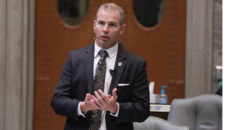“Help Wanted.”
You see it at almost every gas station, grocery store, and restaurant you pass. The business owners in my district are facing the same problem as employers across the country: They just don’t have enough workers. Consumers and businesses alike are suffering financially under the strain of the tightest labor market in recent memory. With 225,000 open jobs in Missouri, policymakers need to come up with solutions to get more people into the workforce.

A sensible place to start is with people trying to get back on their feet and into lawful employment while on probation or after leaving prison. There are more than 55,000 people on probation or parole in Missouri, and getting them into stable jobs is one of the best ways to improve local economies and public safety.
That is why I introduced HB 2088, the Earning Safe Reentry Through Work Act, this session. By rewarding those on supervision with 20 days off their sentence for every 30 days of verified, full-time employment, this bill would encourage more parolees and probationers to enter the workforce, fill open jobs, and turn their lives around.
Rewarding parolees and probationers with time off their sentence is an effective motivation strategy. Studies have found that people on supervision take more initiative when they can earn their freedom back by reaching goals shown to reduce crime. Since 2012, Missouri has used this approach to reward people for abiding by the terms of their supervision and proven its safety. People who earned shorter probation or parole sentences did not re-offend at a higher rate despite the shorter duration of supervision, and 93 percent of them were nonviolent offenders. Now, we should use the same approach to reward people for getting back to work.
Employment is the most consistent predictor of whether or not someone will re-offend. The Missouri Department of Corrections data show that parolees who do not work are three times as likely to return to prison within two years of release as those who even briefly held a full-time job. A study from the U.S. Department of Justice found that more than eight out of 10 people who failed to complete probation were unemployed. Getting people with criminal histories into stable jobs will keep more people out of crime while expanding the workforce available to our local business owners — it’s a win-win for our state.
Importantly, my bill does not change the penalties for any criminal violation, nor does it alter state sentencing requirements or guidelines. Anyone who commits a new crime while on probation or parole will still be sent back to prison and lose any time they earned off of their sentence.
A job is about more than just a paycheck — it’s about taking responsibility for yourself and your family, making respectable connections with your community, and building the confidence to make something out of your future. This national labor shortage has shown all of us how much it hurts society when we don’t have enough workers. But this problem also gives us a unique opportunity to bring the people at the fringe of our community back into the fold — and in doing so transform the lives of people who are struggling to find their place. The Missouri House already overwhelmingly passed this reform, and legislators in the Senate should embrace this commonsense way to help local businesses, empower people to leave behind lives of crime, and make Missouri safer.

Rep. Derek Grier, a Republican, represents HD 100 in the Missouri House.






















